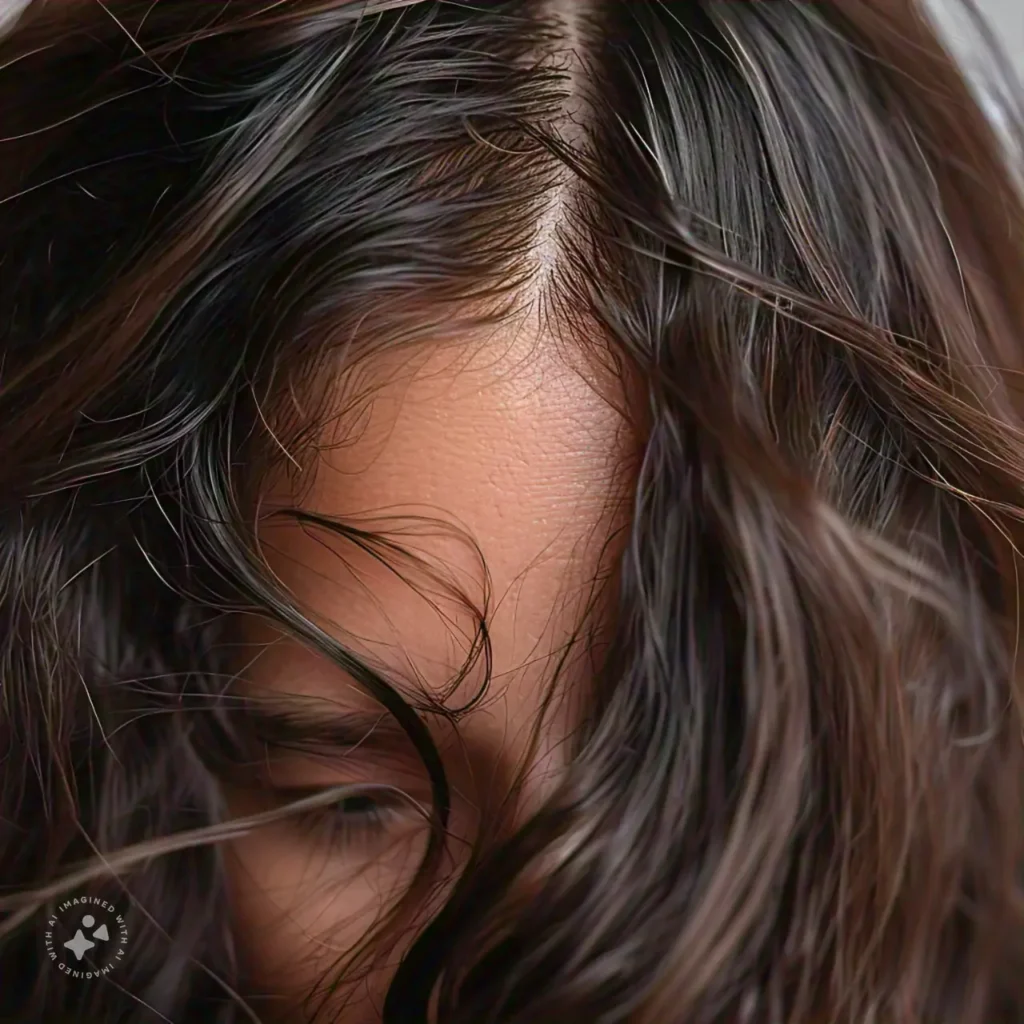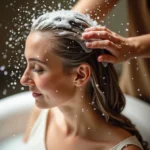A healthy scalp is the foundation for beautiful hair. But if you’re dealing with dandruff, dryness, oiliness, or itchiness, it’s time to shift your focus to scalp care. This comprehensive guide will cover everything from understanding your scalp type to establishing a scalp-friendly routine, addressing common scalp issues, and recommending effective treatments.
What is Scalp Care, and Why is it Important?
Scalp care involves keeping the skin on your scalp clean, balanced, and well-hydrated. When neglected, your scalp can become flaky, itchy, overly oily, or even prone to infections—all of which can negatively impact hair growth and health. By nurturing your scalp, you create an ideal environment for strong, healthy hair growth.
How to Identify Your Scalp Type
Understanding your scalp type is the first step in creating an effective routine. Different scalp types require unique care, so it’s essential to know where yours falls on the spectrum:
- Normal Scalp: Your scalp feels balanced, without dryness or excess oil.
- Dry Scalp: Often accompanied by flakes and irritation, this type lacks moisture and can feel tight.
- Oily Scalp: Produces excess sebum, leaving hair greasy and requiring frequent washing.
- Sensitive Scalp: Prone to redness, itching, or stinging, especially with certain products.
- Combination Scalp: Shows mixed signs, such as oiliness near the hairline but dryness elsewhere.
Understanding your scalp type is much like understanding your hair type; each requires unique care. Learn more about different hair types and their specific care needs to complement your scalp care routine
Benefits of a Regular Scalp Care Routine
A good scalp care routine promotes overall hair health and reduces the risk of common scalp issues. Here are some specific benefits:
- Improves Hair Growth: A well-nourished scalp supports hair follicles, encouraging thicker, faster-growing hair.
- Prevents Dandruff: Regular scalp care can help manage or prevent the buildup of dead skin cells that lead to flakes.
- Controls Oil Production: An effective routine can help balance oil levels, preventing greasiness or dryness.
- Reduces Itching and Irritation: Scalp care can calm sensitive skin, reducing itchiness and discomfort.
Creating the right scalp and hair care routine can seem overwhelming, but by following a structured plan, you can nurture both for optimal health. Check out this guide on the right hair care routine to get started.
Step-by-Step Scalp Care Routine
1. Cleanse Your Scalp Regularly
Shampooing your scalp is essential for removing dirt, sweat, and product build-up. However, it’s important not to over-wash:
- Oily Scalp: Shampoo every 2-3 days with a gentle, sulfate-free formula that removes excess oil without stripping natural moisture.
- Dry Scalp: Wash less frequently with a moisturizing shampoo to avoid stripping essential oils.
- Sensitive Scalp: Opt for hypoallergenic or fragrance-free shampoos that won’t irritate.
Quick Tip: While shampooing, massage your scalp with your fingertips to stimulate blood flow and help cleanse the skin.
2. Exfoliate Weekly to Remove Build-Up
Exfoliating your scalp helps to remove dead skin cells, oil, and product residue that regular shampoo may miss. Use a scrub or an exfoliating brush once a week:
- Normal Scalp: A simple exfoliating brush can work wonders without overdoing it.
- Oily Scalp: Choose a scrub with mild acids, like salicylic acid, to break down excess oil.
- Sensitive Scalp: Stick to a gentle scrub with natural ingredients, like sugar or tea tree oil.
3. Moisturize and Hydrate
A hydrated scalp is less likely to flake or feel irritated. Use a lightweight scalp serum or oil:
- Dry Scalp: Apply a few drops of argan oil, jojoba oil, or coconut oil for added hydration.
- Oily Scalp: Use non-comedogenic products, like aloe vera or tea tree oil, to provide hydration without clogging pores.
How to Apply: Part your hair in sections and apply oil directly to the scalp. Massage gently to ensure even distribution and better absorption.
4. Massage for Blood Circulation
Scalp massage helps improve circulation, which promotes healthy hair growth. Aim to massage your scalp daily for a few minutes:
- Using Fingers: Gently press your fingertips into your scalp, moving in small circles.
- Using a Scalp Massager: Scalp massagers can provide a deep massage without causing strain.
5. Protect Your Scalp from Sun Exposure
Just like your skin, your scalp can be damaged by UV rays, leading to dryness and irritation. Protect your scalp by wearing hats when in the sun or using a UV-protectant spray.
Common Scalp Issues and How to Treat Them
Dandruff
Dandruff is caused by an overgrowth of yeast on the scalp, leading to flakes and itchiness. To manage it:
- Shampoos: Look for ingredients like zinc pyrithione, ketoconazole, or selenium sulfide, which combat dandruff-causing fungi.
- Home Remedies: Apple cider vinegar diluted with water can help balance the scalp’s pH, reducing dandruff naturally.
For more on common hair issues and solutions, including managing dandruff, explore this guide on hair problems and solutions
Dry Scalp
If your scalp feels tight, flaky, or itchy, it may be dry. Combat dryness by:
- Moisturizing Shampoos: Use shampoos with ingredients like shea butter, aloe vera, or hyaluronic acid.
- Hydrating Treatments: Weekly scalp masks or oils (e.g., coconut, jojoba) can lock in moisture.
Oily Scalp
An oily scalp can cause hair to look greasy quickly. To manage oil:
- Clarifying Shampoos: Use once a week to remove excess oil and product buildup.
- Avoid Heavy Conditioners: Keep conditioner on the ends of your hair and avoid the scalp.
Scalp Acne
Acne on the scalp is often caused by clogged pores and bacteria. To reduce acne:
- Anti-Bacterial Ingredients: Look for products with tea tree oil or salicylic acid.
- Avoid Heavy Products: Use lightweight products and avoid applying styling products to the scalp.
DIY Scalp Treatments
1. Apple Cider Vinegar Rinse
Balances scalp pH and removes buildup. Mix one part apple cider vinegar with three parts water and apply after shampooing. Let sit for 5 minutes before rinsing.
2. Tea Tree Oil Treatment
Tea tree oil has antimicrobial properties that help reduce dandruff and itching. Dilute a few drops in a carrier oil and massage it into your scalp before bed.
3. Aloe Vera Mask
Aloe vera soothes an itchy scalp and adds moisture. Apply pure aloe vera gel to your scalp, let it sit for 10-15 minutes, and rinse thoroughly.
4. Coconut Oil Hydration Mask
For dry scalp, apply warmed coconut oil to the scalp and leave it on for at least 30 minutes before shampooing. This helps lock in moisture.
Additional Tips for Maintaining Scalp Health
- Use Lukewarm Water: Hot water can strip essential oils, leading to dryness.
- Avoid Tight Hairstyles: Constant tension on the scalp can weaken hair roots and lead to hair loss.
- Eat a Balanced Diet: Nutrients like omega-3 fatty acids, zinc, and vitamins A, B, and C are essential for a healthy scalp.
- Limit Product Use: Minimize the use of heavy styling products, as they can clog scalp pores.
- Reduce Stress: High stress levels can contribute to scalp issues. Practicing stress-relief techniques can benefit scalp health.
Why Scalp Care Matters: Insights from Research
A healthy scalp doesn’t just support hair growth—it’s essential for overall hair quality. According to a Study on Scalp Hair Health and Hair Care Practices among Malaysian Medical Students, factors like scalp cleanliness, hydration, and balanced oil production significantly impact hair health. The study highlights the importance of a dedicated scalp care routine, especially in preventing common issues like dandruff, dryness, and itchiness.
Frequently Asked Questions (FAQs)
Q: How often should I wash my scalp if I have an oily scalp?
A: Washing every 2-3 days is usually sufficient. Use a clarifying shampoo once a week to remove any buildup.
Q: Is it safe to exfoliate the scalp regularly?
A: Weekly exfoliation is generally safe and beneficial. Over-exfoliating, however, can cause irritation, so stick to once a week.
Q: Can I use facial exfoliants on my scalp?
A: It’s best to use products specifically designed for the scalp, as they’re formulated to suit the scalp’s unique needs.
Q: How can I naturally treat an itchy scalp?
A: Tea tree oil, diluted apple cider vinegar, and aloe vera are excellent natural remedies for soothing itchiness.
Q: Will changing my diet improve my scalp health?
A: Absolutely! Eating a balanced diet rich in vitamins and healthy fats can promote a healthy scalp and hair.






